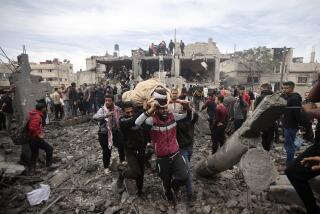Need for Disaster Relief Coordination Stressed
- Share via
MOSCOW — The disastrous Armenian earthquake two weeks ago has shown the need for an international system to coordinate major rescue and relief efforts, the president of the American Red Cross said here Wednesday after visiting the disaster area.
Richard F. Schubert said he believes that a major initiative for such a coordinating system will develop out of the Armenian earthquake and the broad international response to it in an attempt to improve the management of the vast assistance needed for such crises.
“One thing we clearly need to organize is a pipeline (for rescue equipment and relief supplies) that, at one end, puts out what is needed when it is needed and, at the other, takes in and coordinates the donations,” Schubert said. “We want the victims of a disaster to get the assistance they need as quickly as possible, not to be overwhelmed by it.”
Noting calls by Soviet Premier Nikolai I. Ryzhkov and other officials for an international organization to coordinate broad efforts like that undertaken in Armenia, Schubert suggested that the Geneva-based League of Red Cross and Red Crescent Societies was best positioned to do so, if it were better financed.
More than 30,000 tons of relief supplies have been airlifted into Armenia in the last 10 days, more than 29,000 freight cars of material have been sent by rail and truck convoys are arriving from all over the Soviet Union and much of Europe.
“At this point, they need nothing further,” Schubert said. “There may be some very specific needs, but they must be identified. The volume of material they have received is staggering, a real outpouring of genuine sympathy, but it is also more than they can use. I have told our people to send nothing else until what they have is sorted out and their needs are clearer.”
Soviet officials intend to return those relief supplies that were not needed or to donate them for use in another disaster.
“They have a great commitment to using these supplies as they were intended or returning them,” Schubert said. “It is a matter of moral principle for them.”
He said that American and other relief officials should study the problems experienced in the Armenian earthquake to improve their own disaster preparedness.
“If we had an earthquake of this magnitude in California, and we could, the American Red Cross and the U.S. government, as good as we think we are, would really have our hands full and would be struggling to cope,” he said. “Armenia should be a sobering lesson for us. . . . We can learn some things here. We want to debrief Soviet officials about their experiences, their problems, their solutions.”
Dr. Yevgeny I. Chazov, the Soviet health minister, said that as a consequence of the Armenian earthquake and several other smaller disasters here in recent years, he will seek government approval to establish a national system of fast-reaction rescue and medical teams with their own personnel on stand-by, their own air and ground transport, reliable communications and stockpiles of supplies with three regional headquarters.
More to Read
Sign up for Essential California
The most important California stories and recommendations in your inbox every morning.
You may occasionally receive promotional content from the Los Angeles Times.













